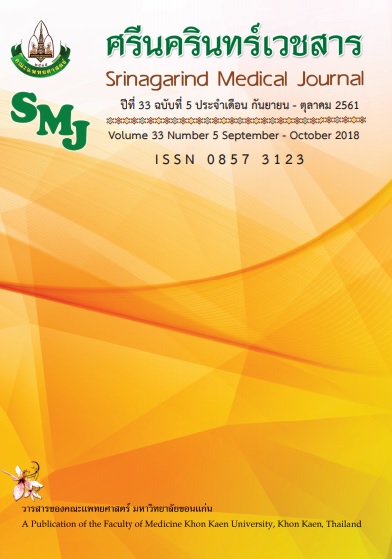Factors that Correlated to Success in Complicated Chronic Diseases Care in Elder at Chiwanan Center, Sawanpracharak Hospital
Keywords:
ผู้สูงวัย; โรคไม่ติดต่อเรื้อรัง; ความสำเร็จในการควบคุมโรค, Elder; non communicable diseases (NCD); Successful factorsAbstract
Background and objective: Initial data from 15th November 2012 to 31st July 2015 indicated that there were 610 patients diagnosed with complicated non communicable diseases (NCDs), with 237 patients – accounting for 38.85 percent – whose NCD can be controlled to specific criteria. This study aimed to evaluate the factors leading to successful control of NCDs.
Methods: This was a descriptive study in patients treated during 1st August 2015 to 31st July 2017. Randomized studying 408 patient records and interviewing – both over the phone and in person during home visiting.
Results: Random 199 patients there were diabetes mellitus 75 patients, hypertension 63 patients, dyslipidemia 56 patients and miscellaneous 5 patients. The three largest factors leading to successful control of NCDs were close care of the patient (OR 5.0, 95%CI 3.2 – 7.8), patient knowledge and outlook in studying the disease and medicine (OR 4.7, 95%CI 2.7 – 8.0), and proper storage of medicine (OR 2.5, 95%CI 1.6 - 4.0).
Conclusion : Three factors leading to successful control of NCDs are close care of the patient, patient’s knowledge and study in diseases and medication, and proper storage of medicine.
References
2. Kongkaew C, Noyce PR, Ashcroft DM. Hospital admissions associated with adverse drug reactions: a systematic review of prospective observational studies. Ann Pharmacother 2008; 42: 1017–25.
3. Claydon-Platt K, Manias E, Dunning T. Development and evaluation of a screening tool to identify people with diabetes at increased risk of medication problems relating to hypoglycaemia and medication non-adherence. Contemp Nurse 2014; 48: 10–25.
4. Kongkaew C, Hann M, Mandal J, Williams SD, Metcalfe D, Noyce PR, et al. Risk factors for hospital admissions associated with adverse drug events. Pharmacotherapy 2013; 33: 827–37.
5. Hayes TL, Larimer N, Adami A, Kaye JA. Medication adherence in healthy elders: small cognitive changes make a big difference. J Aging Health 2009; 21: 567–80.
6. Calvert SB, Kramer JM, Anstrom KJ, Kaltenbach LA, Stafford JA, Allen LaPointe NM. Patient-focused intervention to improve long-term adherence to evidence-based medications: a randomized trial. Am Heart J 2012; 163: 657-65.e1.
7. Claydon-Platt K, Manias E, Dunning T. The barriers and facilitators people with diabetes from a nonEnglish speaking background experience when managing their medications: a qualitative study. J ClinNurs 2014; 23: 2234–46.
8. วาสนา นัยพัฒน์. ปัญหาสุขภาพ ปัญหาการใช้ยาและพฤติกรรมการใช้ยาของผู้สูงอายุ ในชุมชนบ้านพักข้าราชการโรงพยาบาลพระมงกุฎเกล้า. วารสารการพยาบาลและการศึกษา 2553; 3: 2–14.




